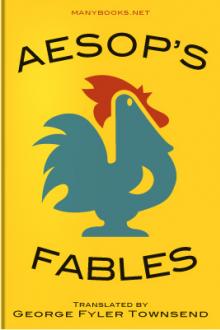author - "Aesop"

me may be rotten;
But if twenty for accidents should be detach'd,
It will leave me just sixty sound eggs to hatch'd.
"Well, sixty sound eggs--no; sound chickens, I mean;
Of these some may die--we'll suppose seventeen--
Seventeen!--not so many--say ten at the most,
Which will leave fifty chickens to boil or to roast.
"But then there's their barley; how much will they need?
Why they take but one grain at a time when they feed,
So that's a mere trifle; now then let us see,
At a fair market price, how much money there'll be?
"Six shillings a pair--five--four--three-and-six,
To prevent all mistakes, that low price I will fix;
Now what will that make? fifty chickens, I said,
Fifty times three-and-sixpence--_I'll ask brother Ned_.
"Oh! but stop--three-and-sixpence a _pair_ I must sell 'em; Well, a pair is a couple--now then let us tell 'em;
A couple in fifty will go--(my poor brain!)
Why just a score times, and five pair will remain.

t a distance, and do not come near me, for if you touch me ever so slightly, I shall be broken in pieces; and besides, I by no means wish to come near you."
Equals make the best friends.
The Gnat and the Lion.
A Gnat came and said to a Lion: "I do not the least fear you, nor are you stronger than I am. For in what does your strength consist? You can scratch with your claws, and bite with your teeth--so can a woman in her quarrels. I repeat that I am altogether more powerful than you; and if you doubt it, let us fight and see who will conquer." The Gnat, having sounded his horn, fastened itself upon the Lion, and stung him on the nostrils. The Lion, trying to crush him, tore himself with his claws, until he punished himself severely. The Gnat thus prevailed over the Lion, and buzzing about in a song of triumph, flew away. But shortly afterwards he became entangled in the meshes of a cobweb, and was eaten by a spider. He greatly lamented his fate, saying: "Woe is me, that I, who can wa

he Woodman seized his axe, and with one stroke cut the Serpent in two. "Ah," said he,
"No gratitude from the wicked."
The Bald Man and the Fly
There was once a Bald Man who sat down after work on a hot summer's day. A Fly came up and kept buzzing about his bald pate, and stinging him from time to time. The Man aimed a blow at his little enemy, but acks palm came on his head instead; again the Fly tormented him, but this time the Man was wiser and said:
"You will only injure yourself if you take notice of despicable enemies."
The Fox and the Stork
At one time the Fox and the Stork were on visiting terms and seemed very good friends. So the Fox invited the Stork to dinner, and for a joke put nothing before her but some soup in a very shallow dish. This the Fox could easily lap up, but the Stork could only wet the end of her long bill in it, and left the meal as hungry as when she began. "I am sorry," said the Fox, "the soup is not to your liking."
"Pray

at who can."
The Fox and the Goat
A FOX one day fell into a deep well and could find no means of escape. A Goat, overcome with thirst, came to the same well, and seeing the Fox, inquired if the water was good. Concealing his sad plight under a merry guise, the Fox indulged in a lavish praise of the water, saying it was excellent beyond measure, and encouraging him to descend. The Goat, mindful only of his thirst, thoughtlessly jumped down, but just as he drank, the Fox informed him of the difficulty they were both in and suggested a scheme for their common escape. "If," said he, "you will place your forefeet upon the wall and bend your head, I will run up your back and escape, and will help you out afterwards." The Goat readily assented and the Fox leaped upon his back. Steadying himself with the Goat's horns, he safely reached the mouth of the well and made off as fast as he could. When the Goat upbraided him for breaking his promise, he turned around and cried out, "You foolish old fellow! If

Description
Whether it’s the benefits of taking it slow and steady (“The Tortoise and the Hare”), the necessity of invention (“The Crow and the Pitcher”), or the problems of cognitive dissonance (“The Fox and the Grapes”), Aesop has a fable for every occasion. Aesop lived in Greece in the 6th century BCE, far enough in the past that it’s become impossible to ascribe all these fables to him. Some were certainly retellings of older myths, some share their roots in collections of fables from India and further afield, and many were added well after his time. However, they all share a certain quality of prose that marks them out as belonging to the collection regardless of authorship. It’s that quality, combined with their insight into the human character, that has meant that they’ve stood the test of time for twenty-five centuries.
This collection is the 1912 translation by V. S. Vernon Jones, comprising two hundred and eighty-four of the fables.

me may be rotten;
But if twenty for accidents should be detach'd,
It will leave me just sixty sound eggs to hatch'd.
"Well, sixty sound eggs--no; sound chickens, I mean;
Of these some may die--we'll suppose seventeen--
Seventeen!--not so many--say ten at the most,
Which will leave fifty chickens to boil or to roast.
"But then there's their barley; how much will they need?
Why they take but one grain at a time when they feed,
So that's a mere trifle; now then let us see,
At a fair market price, how much money there'll be?
"Six shillings a pair--five--four--three-and-six,
To prevent all mistakes, that low price I will fix;
Now what will that make? fifty chickens, I said,
Fifty times three-and-sixpence--_I'll ask brother Ned_.
"Oh! but stop--three-and-sixpence a _pair_ I must sell 'em; Well, a pair is a couple--now then let us tell 'em;
A couple in fifty will go--(my poor brain!)
Why just a score times, and five pair will remain.

t a distance, and do not come near me, for if you touch me ever so slightly, I shall be broken in pieces; and besides, I by no means wish to come near you."
Equals make the best friends.
The Gnat and the Lion.
A Gnat came and said to a Lion: "I do not the least fear you, nor are you stronger than I am. For in what does your strength consist? You can scratch with your claws, and bite with your teeth--so can a woman in her quarrels. I repeat that I am altogether more powerful than you; and if you doubt it, let us fight and see who will conquer." The Gnat, having sounded his horn, fastened itself upon the Lion, and stung him on the nostrils. The Lion, trying to crush him, tore himself with his claws, until he punished himself severely. The Gnat thus prevailed over the Lion, and buzzing about in a song of triumph, flew away. But shortly afterwards he became entangled in the meshes of a cobweb, and was eaten by a spider. He greatly lamented his fate, saying: "Woe is me, that I, who can wa

he Woodman seized his axe, and with one stroke cut the Serpent in two. "Ah," said he,
"No gratitude from the wicked."
The Bald Man and the Fly
There was once a Bald Man who sat down after work on a hot summer's day. A Fly came up and kept buzzing about his bald pate, and stinging him from time to time. The Man aimed a blow at his little enemy, but acks palm came on his head instead; again the Fly tormented him, but this time the Man was wiser and said:
"You will only injure yourself if you take notice of despicable enemies."
The Fox and the Stork
At one time the Fox and the Stork were on visiting terms and seemed very good friends. So the Fox invited the Stork to dinner, and for a joke put nothing before her but some soup in a very shallow dish. This the Fox could easily lap up, but the Stork could only wet the end of her long bill in it, and left the meal as hungry as when she began. "I am sorry," said the Fox, "the soup is not to your liking."
"Pray

at who can."
The Fox and the Goat
A FOX one day fell into a deep well and could find no means of escape. A Goat, overcome with thirst, came to the same well, and seeing the Fox, inquired if the water was good. Concealing his sad plight under a merry guise, the Fox indulged in a lavish praise of the water, saying it was excellent beyond measure, and encouraging him to descend. The Goat, mindful only of his thirst, thoughtlessly jumped down, but just as he drank, the Fox informed him of the difficulty they were both in and suggested a scheme for their common escape. "If," said he, "you will place your forefeet upon the wall and bend your head, I will run up your back and escape, and will help you out afterwards." The Goat readily assented and the Fox leaped upon his back. Steadying himself with the Goat's horns, he safely reached the mouth of the well and made off as fast as he could. When the Goat upbraided him for breaking his promise, he turned around and cried out, "You foolish old fellow! If

Description
Whether it’s the benefits of taking it slow and steady (“The Tortoise and the Hare”), the necessity of invention (“The Crow and the Pitcher”), or the problems of cognitive dissonance (“The Fox and the Grapes”), Aesop has a fable for every occasion. Aesop lived in Greece in the 6th century BCE, far enough in the past that it’s become impossible to ascribe all these fables to him. Some were certainly retellings of older myths, some share their roots in collections of fables from India and further afield, and many were added well after his time. However, they all share a certain quality of prose that marks them out as belonging to the collection regardless of authorship. It’s that quality, combined with their insight into the human character, that has meant that they’ve stood the test of time for twenty-five centuries.
This collection is the 1912 translation by V. S. Vernon Jones, comprising two hundred and eighty-four of the fables.
